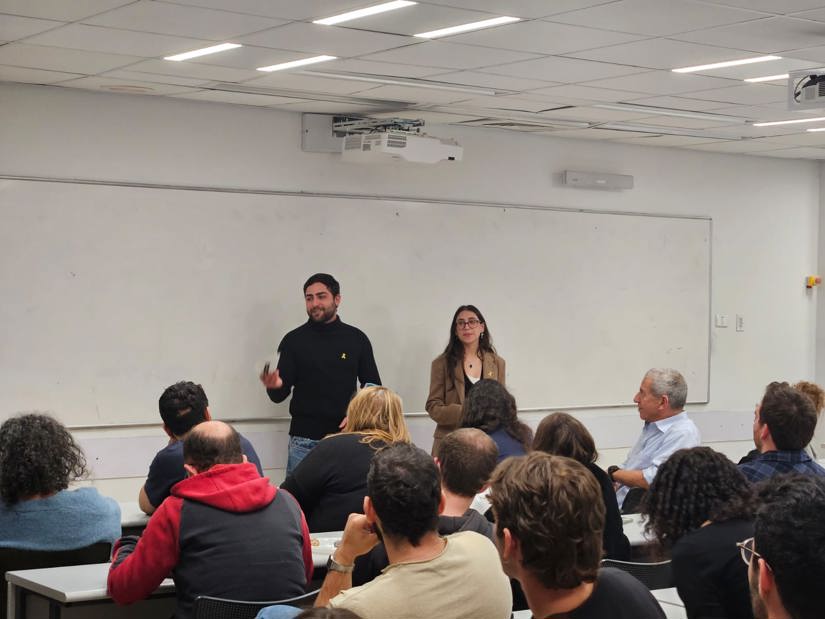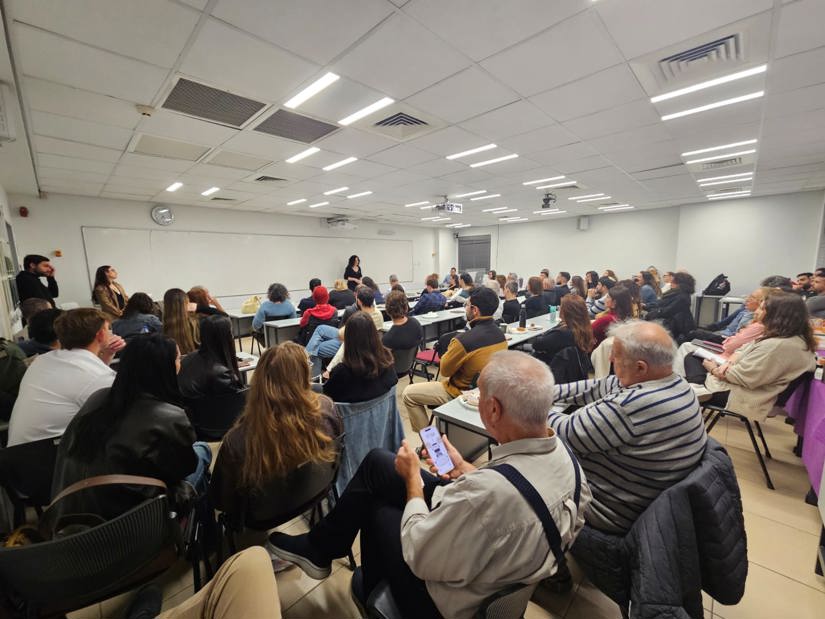
From Vision to Action: SmartUp Students Present Their Solutions
Alon Kaminer, 28, was severely injured in battle in Khan Yunis and is considered one of the war's most severely wounded - having lost both hands, a leg, and an eye. Despite undergoing such physical and emotional trauma, Kaminer has channelled his energy to work closely with Afeka College of Engineering's SmartUp honors program — which this year sees students creating accessibility solutions for the many students facing new physical challenges as a result of the war — as a partner and advisor of the program. In doing so, he’s committed to ensure that their projects will provide the utmost benefits and impact to their end-users.
Kaminer’s expertise was much needed as this year’s cohort of SmartUp students were tasked to develop technological solutions to make the academic environment more accessible for the student reservists facing new physical challenges and disabilities due to the Swords of Iron War.
Kaminer said, “Afeka contacted me before the program even started. They understood the concept that you really can't get involved with a specific group of people who need something without getting them involved as well. When they contacted me and asked if I wanted to get involved and join them, I said absolutely. I have a lot of respect for the program.”
As the first semester of the 2024/25 academic year ends, students have completed the initial phase of their projects, and, in an inspiring event on campus, presented their innovative proposals. Having spent the semester researching needs, conducting workshops and market research, and engaging in intensive brainstorming with partners and end-users, a cohort of 25 students formed five multidisciplinary teams, each tackling and developing innovative solutions to different challenges.
Afeka President, Prof. Ami Moyal, was impressed by his student's ingenuity: “The evening was a reminder that engineering is much more than algorithms and formulas - it's a powerful tool for improving human lives. We are proud of our students who chose to use their knowledge and skills to create a more accessible and equitable campus for their peers who were injured in the war,” he said.
With around 44% of Afeka's student body called up to reserve duty over the past year and a half, its student body has been disproportionately affected by the ongoing war. The struggles faced and overcome since the onset of the war, however, have highlighted Afeka’s role at the forefront of strengthening the connection between academia and national security, as well as the vital link between technological innovation and national resilience — and SmartUp is an embodiment of this.
During their presentation, members of the ‘Real Ability’ team described their virtual reality and sensor-based ‘disability simulation’ concept that will enable able-bodied students to step into the shoes of disabled individuals and experience for themselves what different disabilities feel like. The tool is designed to raise awareness and understanding, deepen exposure to challenges, and serve as an educational and engineering tool for others.
For Ido Kadosh, an Industrial Engineering student working on ‘Real Ability’, the project is deeply personal:
“My brother was injured in this war, physically but also mentally,” shared Kadosh. “His injuries have become a big part of my life, so being here and working on this project has helped close a circuit for me – it’s helped me better understand the difficulties that I have never experienced before. I really hope it will help other people understand.
Meanwhile, Nitzan Jokel, a mechanical engineering student and member of the team behind ‘S-Table’ – an attachable, origami-style folding wheelchair table designed to ensure wheelchair users always have an accessible surface to study, work, and move around campus – describes how the hands-on and community-based approach of the SmartUp program has made the experience even more special.
“It brings a bunch of different people from around Afeka together which makes it very special. It makes you feel that you have a place to learn more than just math or physics..., but also how to use it in practice,” said Jokel. “It makes you understand what you’re studying for and gives you purpose.”

Other students described how their team tackled the challenge of notetaking in class for disabled students – particularly when it comes to copying down math functions and equations. Their ‘MatHit’ mathematics keyboard is designed to help students with hand injuries or motor function difficulties to easily copy down complicated equations and keep pace with their lecturers and peers.
“Right now, with existing keyboards, writing an equation in a word file is a nightmare,” explained software engineering student, Gal Shemesh. “It takes two or three minutes to just find the right symbol. So, if I’m in a class and the lecture is writing like five equations and I’m only able to write down one, it’s bad and I fall behind.”
Other solutions presented by the students included SafePoint – a foldable, modular safe space for easy access in emergencies, and a specialized indoor navigation application, called Vision, designed to help disabled students find the most efficient and accessible routes around campus.
Dr. Efrat Perel, head of the SmartUp honors program, has been with the students throughout the program and describes herself as a “proud mama” when speaking about her students.
While she has offered guidance and advice along the way, Perel says she is amazed at the creativity of her students and how far they’ve been able to elevate the concept of the projects.
With SmartUp, she said, students “have a unique opportunity to be creative, to own the concept, and make it theirs, and I'm thrilled by their ideas and the concepts they’ve come up with.”



More than Algorithms and Formulas: Afeka Students Tackle Campus Accessibility and Equitability for Students with Disabilities
Share a link using:
https://www.afeka.ac.il/en/afeka-news/magazine/more-than-algorithms-and-formulas-afeka-students-tackle-campus-accessibility-and-equitability-for-students-with-disabilities/WhatsApp
Facebook
Twitter
Email
https://www.afeka.ac.il/en/afeka-news/magazine/more-than-algorithms-and-formulas-afeka-students-tackle-campus-accessibility-and-equitability-for-students-with-disabilities/